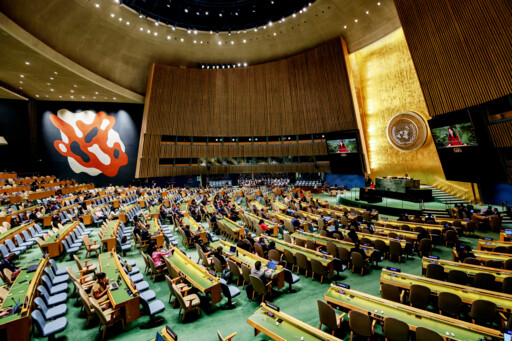


The UN at 80: challenges and pathways for renewal in changing world

The general debate of the 80th session of the UN General Assembly took place in New York from Sep. 23 to 29. Photo: IC PHOTO
Since its founding 80 years ago, the United Nations has made enduring contributions to peace and development worldwide. Today, as the world enters a new period of turbulence and transformation, the UN faces multifaceted challenges and must adapt, innovate, and reform in order to reinvigorate multilateralism and tackle the pressing issues confronting global governance.
The UN’s significant contributions to postwar world
In the fragmented world that emerged after World War II, the UN helped establish universally recognized and observed international rules, multilateral mechanisms, and governance frameworks. Over the past 80 years, the international community has gradually developed the international system with the UN at its core, the international order underpinned by international law, and the basic norms of international relations based on the purposes and principles of the UN Charter.
Over the decades, the UN has also served as a platform for multilateral dialogue and a mechanism for collective security. It has worked tirelessly to prevent conflicts, facilitate peace processes, and create and sustain conditions for lasting peace—helping to avert large-scale wars while limiting the scope, frequency, and intensity of regional conflicts. The UN has likewise made great efforts to promote global economic growth and to advance education, health, gender equality, and environmental protection. Through initiatives such as the Human Development Index, the Millennium Development Goals, and the Sustainable Development Goals, it has forged global consensus, mobilized resources, and coordinated collective action. Finally, the UN acts as the world’s primary institution for protecting human rights and the central actor in global humanitarian aid. It has achieved remarkable progress in safeguarding women, children, and vulnerable groups, greatly improving their living conditions and prospects for development.
Internal, external challenges confronting the UN
Today, geopolitical conflicts, great-power competition, and unilateralism are severely eroding multilateralism, while traditional security concerns coexist with non-traditional threats such as climate change, cybersecurity, and the risks posed by artificial intelligence. Certain major powers continue to pursue unilateral strategies, resulting in frequent failures of coordination and hindering timely responses to urgent geopolitical crises. However, as the cornerstone of the global governance system, the UN often struggles to address these challenges—its governance effectiveness has declined, operational inefficiencies persist, and its authority faces growing skepticism.
The current international landscape differs sharply from that of the UN’s founding era, yet the organization still relies on its original institutional structures and modes of operation, which no longer keep pace with the times. Calls for reform have amplified in recent years, but both historical experience and present realities suggest that meaningful change will be arduous. Reform—particularly of core bodies such as the Security Council—entails a redistribution of power among states, inevitably stirring contention among member nations and interest groups.
Building a stronger, more effective UN
Looking ahead, the UN can adapt to global changes and enhance its operational efficiency and effectiveness by focusing on the following priorities.
First, UN reform is gaining momentum, marking a pivotal moment for change. The “Global South,” with its increasing influence, seeks a greater role on the international stage and repeatedly calls for a transformation of the global governance system. The Pact for the Future, adopted at the UN Summit of the Future in 2024, set out a “roadmap” for revitalizing multilateralism and steering global governance reform. The UN80 initiative, launched by Secretary-General António Guterres in March 2025, aims to transform how the UN works—identifying efficiencies, reviewing how mandates are implemented, and examining potential structural changes and program realignment within the UN system.
Second, the UN should take the lead in promoting multilateral cooperation in emerging fields and on new issues. The increasingly widespread adoption of AI technology, for example, has substantially enhanced human productivity but also introduced various development and security risks. However, AI governance has lagged far behind technological advances due to intensified competition and uneven technological development among nations. As the most representative and authoritative institution of global governance, the UN should take the initiative to establish cooperative platforms and guide the formulation of norms for international AI governance.
Finally, the UN should urge major powers to unite and cooperate. Harmonious and stable relations among major powers are crucial to maintaining international order and fostering global governance collaboration. The UN should continue to build bridges and platforms that facilitate cooperation among these countries, while guiding them in the governance of emerging technologies such as AI and lethal autonomous weapons systems, as well as in new frontiers, including cyberspace, outer space, the deep sea, and the polar regions. By shaping new governance agendas, the UN can help break deadlocks in traditional areas of cooperation and lead the international community toward collaboration on emerging issues.
Chen Xiangyang (research fellow), Zhao Jingya, and Huang Zheng are from the China Institutes of Contemporary International Relations. This article has been edited and excerpted from Contemporary International Relations, Issue 6, 2025.
Editor:Yu Hui
Copyright©2023 CSSN All Rights Reserved